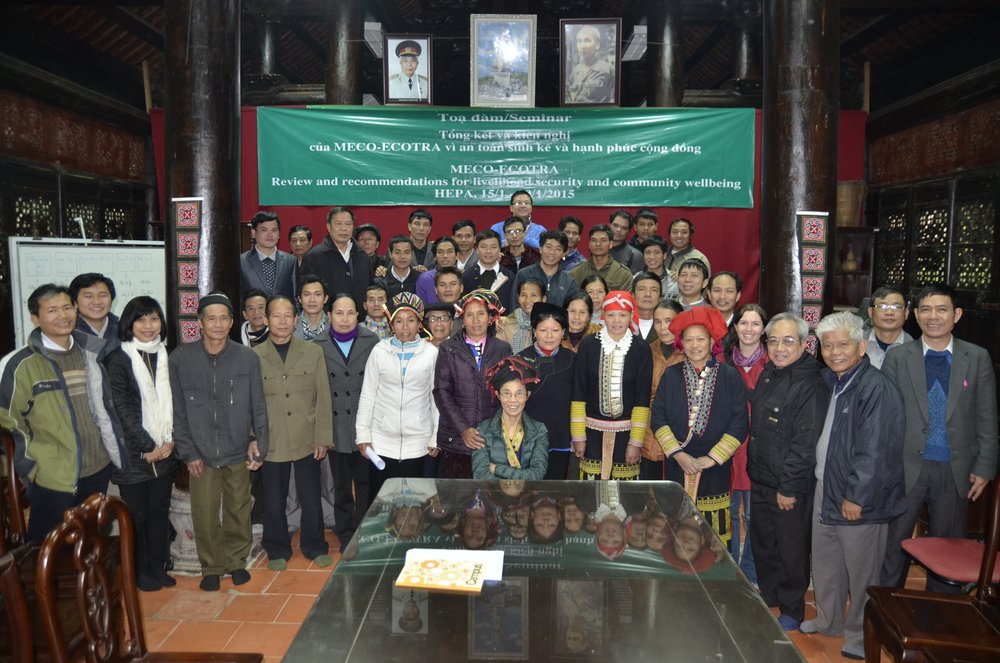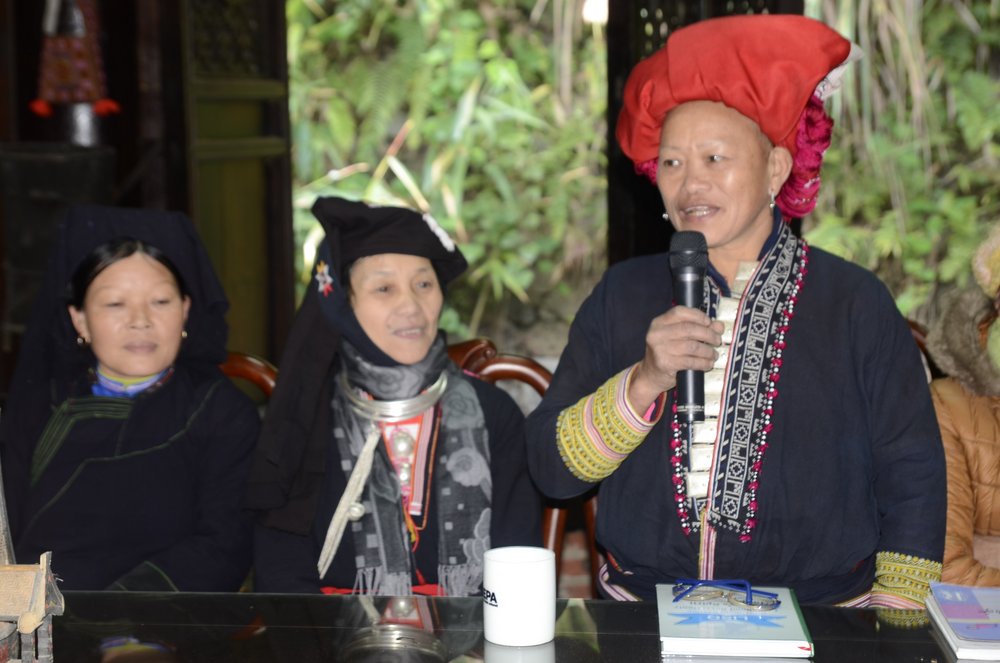This seminar was held in the Human Ecology Practical Area (HEPA) in Son Kim I commune, Huong Son district, Ha Tinh province from 15 to 19 January, 2015. There are 33 participants representing for 9 ethnic groups (H’mong, Dao, Tay, Nung, Ma Lieng, Gia Rai, H’re, Ro Ngao, and Thai) from 9 provinces of Vietnam and young ecological farmers from Laos and Vietnam. This forum is a continuation of the seminar on ‘Young leadership secretariats for self-sufficient livelihood security and community wellbeing’, which was previously organized in HEPA.

Forestland rights, cultural values, local knowledge and community initiatives for promotion of the allocated land are among cross-cutting issues which were focused and discussed by the participants. From the entire group discussions, panel discussions and group presentations, it was found that each localities and ethnic groups has their own specific situation, however they share a common concern on the direct impacts of forest land on their lives. The participants deeply perceived that land is the foundation for existence and development of each clans, communities and ethnic groups. Communities who have obtained land right certificates have been confidently conducting production, stabilizing their lives and protecting forests, soils and water sources by themselves, and simultaneously promoting their cultural values. Pilot models of successful (post-)land allocation have been found in the H’mong community in On Oc village, Muong Lum commune, Yen Chau district, Son La province; the Thai ethnic group in Pom Om village, Hanh Dich commune, Que Phong district, Nghe An province; Kinh group in Khe 5 village, Son Kim I commune, Huong Son district, Ha Tinh province; and H’re ethnic group in Violak village, Po E commune, Konplong district, Kon Tum province. In addition, households and individuals who have land certificates have been seeking suitable indigenous seeds and finding ways to integrate them to create agro-forestry gardens for their long-term stable lives and wellbeing on their valuable ancestral land.
In contrary to the above mentioned successful cases, many local communities and people are facing shortage of forestland or even landless. This discrepancy interrelated closely with increasing difficulties, hunger, mono-crop plantation, use of poisonous chemicals, dependency on market, deforestation, and degradation of soils and water sources. These things negatively affect cultural identity and confidence of the community members. The participants provided evidences showing that community forestland rights were very vulnerable, because people had been suffering from land infringement caused by outsiders even when community’s land certificates had been granted. Specifically, a case happened in the Chieng village, which locates near the above mentioned Pom Om village, where the Que Phong rubber enterprise sought all the ways to conquer the rest and small forestland area from the local community disregarding local shortage of land and villagers’ resentment.

The participants shared their interests and consideration of how to use their allocated forest land to create local unique products and simultaneously improve their living condition. Community representatives have recognized values of intellectual property and trademark for their specific ecological local products. Intellectual property does not only relates to maintenance of livelihood sovereignty, but also community spirits and identity. If a community does not keep cohesion and internal strength well, it will be difficult for them to achieve expected results because of a danger caused by companies who want to steal community’s spiritual property or to encroach local forest land.
Multi-dimensional realities reflected by representatives of various backgrounds have brought about contributions, recommendations and critiques to forest land and development policies in mountainous areas. All participants showed their inspiration for sufficient land for production and recognition of local land tenure. They expected a clear legal provision on benefits for community and local households who have land certificates granted. Besides local people needed resources and specific policies which stimulate people to promote their forests and stabilize their lives upon forestry works.
Discrepancies relating to legal provision of religious land, bureaucratic land planing and official forest classification have been addressed by participants for further discussion on solutions. Payment for environmental forestry services should be assessed, in which central government should play a role in coordinating different localities for a equal share for every local people who rely on forests. In several localities villagers have been protecting watershed forests according to their traditional customs for generations and have been granted land certificates. Those forest areas function as protected forests, however they are officially classified as production forests. And only on the basis of this classification, local community can access to the grant of land certificates. While protection forests are favourably allocated to state management boards of forest protection areas or natural reserves and national parks, special-use forests are strictly controlled by those state agencies. Because of this discrepancy, communities - for instance - the Thai in the mentioned Pom Om village, have not yet accessed to any environmental forestry service payment though they have protected forests well for a long time.
Religious land is restricted in grounds having communal houses, temples, shrines, pagodas, worship halls and family shrines as defined in Section 1, Article 160 of the 2013 Land Law. This derives from viewpoints of the lowland Vietnamese, but not suitable to ethnic minority groups in mountainous areas. Indigenous ethnic minority people have various types of religious land for worshipping mother earth, such as sacred forests, tops of mountains, rocks, water sources, etc., and they do not necessarily set up buildings as prescribed in the Land Law. Community sacred areas are soundly protected according to traditional believes and customs, and the effect of local forest protection is as significance as that of the state forest agencies. Therefore participants recommended policy makers reconsider and solve the shortcomings while dealing with the coming revised draft law on Forest Protection and Development.
Phạm Văn Dũng (SPERI)